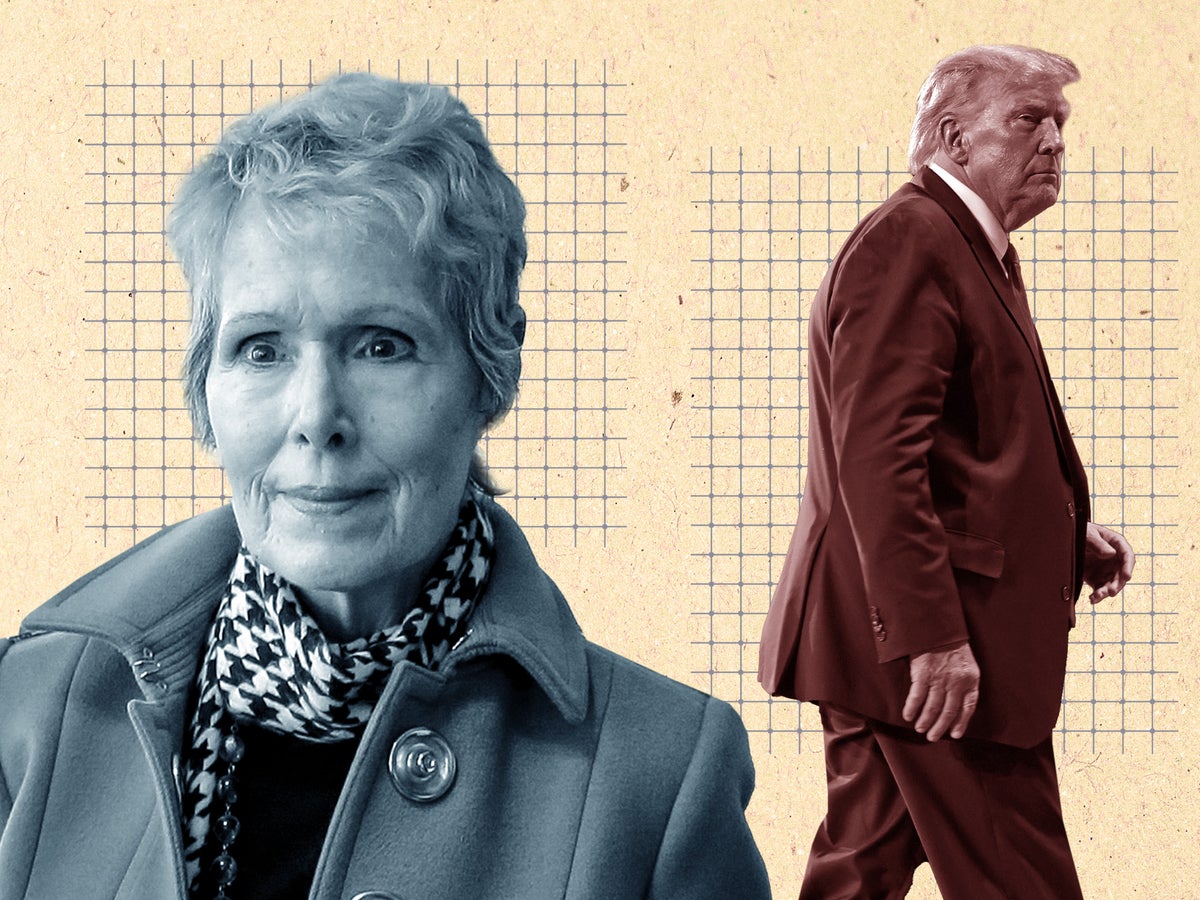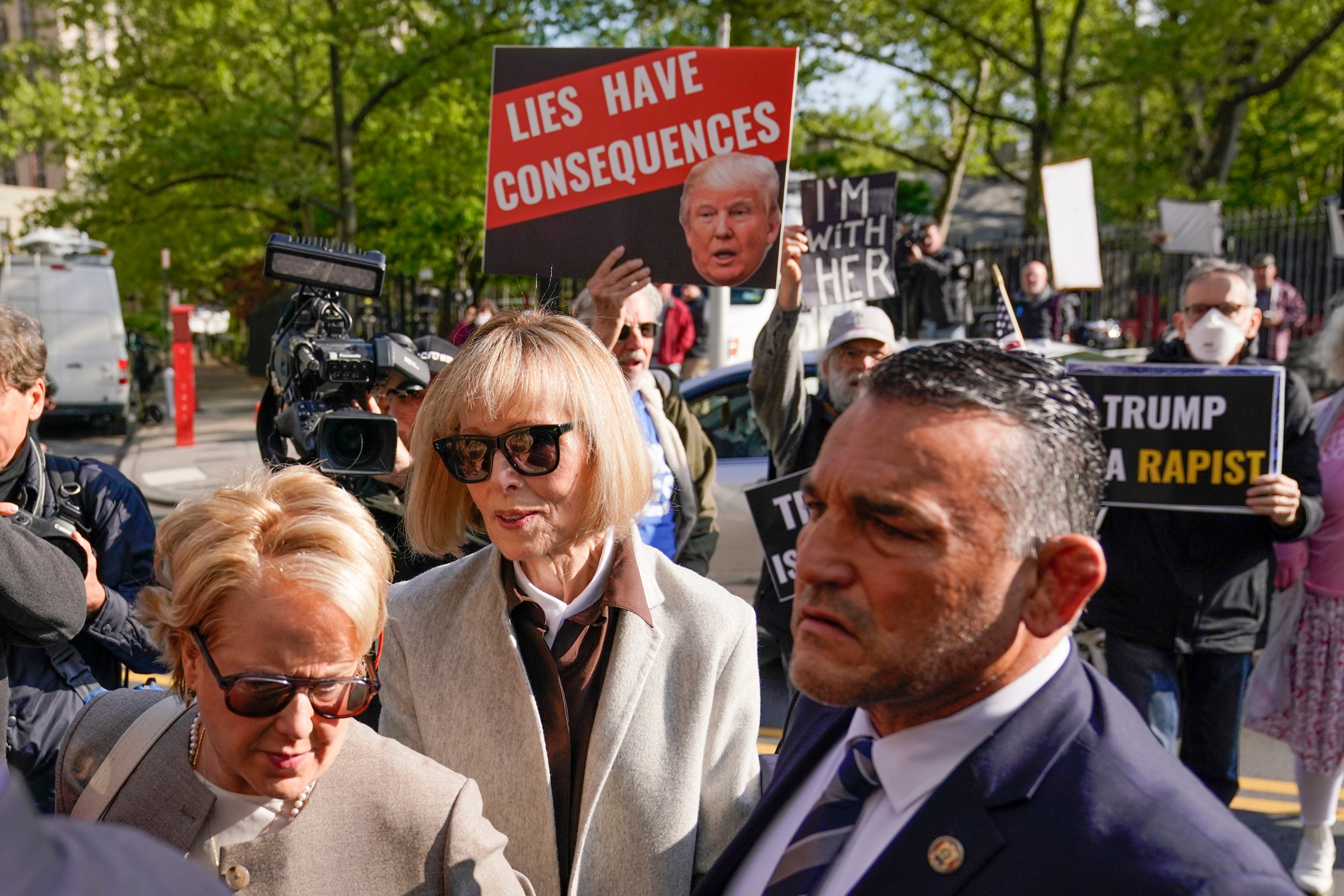
Decades after she was allegedly raped by a New York real estate mogul who would go on to be the 45th President of the United States, E Jean Carroll is getting her day in court.
Ms Carroll, a writer and former advice columnist for Elle magazine, is the plaintiff in a pair of civil lawsuits against former president Donald Trump.
One of those lawsuits is now being presented in a New York City federal courtroom under the supervision of US District Judge Lewis Kaplan. The proceedings began on 25 April.
The jurors in the trial will remain anonymous on Judge Kaplan’s orders due to the risk of threats, intimidation or outright violence against anyone seen as an enemy by Mr Trump and his supporters as they hear evidence of allegations made by Ms Carroll against the twice-impeached and indicted ex-president.
Ms Carroll has claimed that Mr Trump raped her in a dressing room at the Bergdorf Goodman department store in Manhattan in the mid-1990s.
The magazine columnist spoke out about the allegations for the first time in 2019 when Mr Trump was president.
After he denied the allegations and accused her of lying in a bid to bolster sales of her forthcoming book, she filed a defamation lawsuit against him in November 2019.
That suit stalled in the courts for years and is yet to make it to trial.
Then, last year, New York lawmakers passed the state’s Adult Survivors Act, giving sexual abuse victims a one-year window to sue attackers for assaults that took place years ago.
That law paved the way for Ms Carroll to file a second lawsuit against the former president in November accusing him of both raping her and then defaming her years later by denying the assault took place.
That second lawsuit – seeking damages and a retraction of his denial – is now playing out in a New York court.
What Carroll said about the alleged dressing room rape
The allegations against Mr Trump were first laid out in an excerpt from her book What Do We Need Men For? A Modest Proposal, that ran in New York magazine in June 2019.
In the book excerpt, she said she was shopping at the Bergdorf-Goodman department store in New York when Mr Trump approached her and struck up a conversation, with him asking her for help picking out a gift for a woman.
She then alleged that he took her to the lingerie section of the store and asked her to try on an item for him in a dressing room before pinning her up against a wall and sexually assaulting her for three minutes.
At the time, Ms Carroll said the emergence of the #MeToo movement in late 2017 motivated her to tell her story publicly.
Mr Trump addressed the allegations days later when pressed on them by reporters at the White House.
He claimed he had “never met her” and denied raping her by telling the White House press corps that Ms Carrol was “not [his] type”.
He also accused her of lying to boost sales of her memoir.
“She is trying to sell a new book – that should indicate her motivation,” the then-president said, adding that her book “should be sold in the fiction section”.
Ms Carroll pushed back on his claims, sharing a photo of herself and Mr Trump together with his then-wife Ivana Trump and her then-husband John Johnson at an NBC party in 1987 to show they had met.
In her 2019 defamation suit against Mr Trump, she alleged his denials had caused her “to suffer reputational, emotional, and professional harm” and said she was suing “to obtain redress for those injuries and to demonstrate that even a man as powerful as Trump can be held accountable under the rule of law”.
Justice Department involvement delayed the defamation suit
Although a Clinton-era Supreme Court case, Jones v Clinton, allows presidents to be sued for conduct which occurred before the start of their time in the White House, Mr Trump’s legal team asked the Department of Justice to aid in his defence of the 2019 case.
The department filed papers seeking to shield him from liability on the grounds that he was acting in an official capacity as president when he made the allegedly defamatory statements about Ms Carroll. But Judge Kaplan rejected those arguments and said the suit could proceed. An attempt by Mr Trump to appeal that decision failed in September 2021 as well.
His legal team took up another approach in February of last year when they moved to countersue Ms Carroll.
But Judge Kaplan blocked that bid in a scathing decision on 11 March 2022, in which he slammed Mr Trump’s continuing attempts to delay the case as “futile” and in “bad faith”.
“The defendant’s litigation tactics, whatever their intent, have delayed the case to an extent that readily could have been far less,” Judge Kaplan wrote.
“Granting leave to amend without considering the futility of the proposed amendment needlessly would make a regrettable situation worse by opening new avenues for significant further delay”.
Letting Mr Trump countersue “would make a regrettable situation worse,” the judge added.
Carroll suing Trump for alleged rape
Last year, New York Governor Kathy Hochul signed into law the Adult Survivors Act, which created a one-year suspension of statutes of limitations for rape and other civil claims arising from allegations of sexual misconduct.
The law allows sexual assault survivors to sue their attackers regardless of when the alleged assault may have taken place.
In November 2022, shortly after the bill signing, Ms Carroll filed a second lawsuit against Mr Trump for rape.
The new case accuses him of battery – and also adds a new defamation claim based on recent posts in which he called her a “con job”.
Both lawsuits are seeking monetary damages from the ex-president.
Judge Kaplan rejected Trump’s last-minute delay bid
After Mr Trump’s lawyers made an 11th-hour attempt to once again postpone the long-delayed civil trial on the grounds that publicity surrounding his recent indictment necessitated a “cooling-off” period to ensure an impartial jury, Judge Kaplan said the one-month delay Mr Trump’s attorneys had asked for would have no impact on the potential jury pool in the case, which will be tried in the US District Court for the Southern District of New York.
“There is no reason to assume that a sufficient number of fair and impartial jurors cannot be found on April 25, 2023 or that it would be materially easier to find such jurors on May 23, 2023,” he said.

Is Trump attending?
In a court filing a week prior to the trial, Mr Trump said he shouldn’t attend as he doesn’t want to “burden” New York City.
In a letter to Manhattan federal court Judge Lewis Kaplan on 19 April, Mr Trump’s attorney Joe Tacopina said that the former president “wishes” to attend the civil trial beginning next week – but is concerned about the “logistical and financial burdens” of his attendance on “the courthouse and New York City”.
On 2 May, Mr Tacopina confirmed that Mr Trump would not testify in the case, meaning it is even more unlikely that he will ever set foot in the courthouse.
Ms Carroll meanwhile is attending the proceedings.







